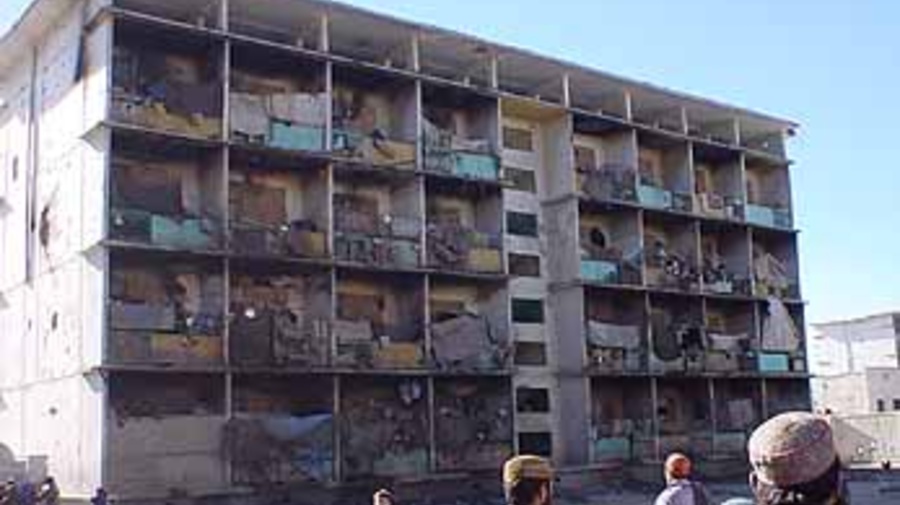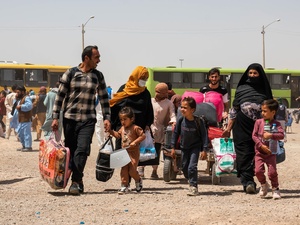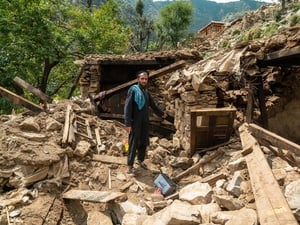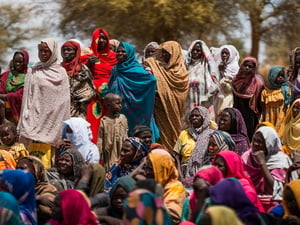Thousands of Afghans returning home with help from UNHCR
Thousands of Afghans returning home with help from UNHCR

A building at the Soviet compound in Kabul, where thousands of people from the Shomali Plain have been squatting.
KABUL, March 5 (UNHCR) - Thousands of Afghans are returning home from Pakistan under a repatriation programme launched by UNHCR, and the agency announced plans Tuesday to transport a second wave of internally displaced people back to their homes in the once-fertile Shomali Plain.
More than 2,600 Afghans drove across the border near the Pakistani city of Peshawar Tuesday in cars and trucks loaded with beds, mattresses and furniture, the belongings accumulated during their long years in exile.
The UNHCR programme to help those returning, which officially began last Friday, has quickly proved popular. While only 200 Afghans registered on the first day at the Takhta Baig Voluntary Repatriation Centre, more than 3,000 people went home Monday.
To date, 5,800 Afghans, some from as far away as Karachi and Lahore, have crossed the frontier to return to their war-shattered country.
In a separate operation, the refugee agency will begin transporting an estimated 15,000 internally displaced people from Kabul to their homes in the Shomali region of central Afghanistan. The Afghans, who fled their homes almost three years ago, have been squatting in unsanitary conditions at the old Soviet embassy compound in the capital.
This is the second time that UNHCR has returned internally displaced Afghans back to the Shomali Plain, once central Afghanistan's breadbasket that has been reduced to a barren wasteland after years of war and drought. The farms and villages of many of the returnees were destroyed and pillaged during the years of the Taliban regime.
Last December and January, the U.N. refugee agency and its partners helped move more than 8,000 Afghans from the Panjshir Valley back to Shomali. Another 8,000 people are known to have spontaneously returned to the area on their own.
To help the returnees rebuild their homes, UNHCR will provide them with shelter materials, including beams, doors, and windows as well as hammers, nails, and door hinges. They will also receive packets of seeds and farming tools so they can once more plant and grow crops.
Since December, UNHCR has distributed thousands of packages to some 138,000 internally displaced persons in central Afghanistan to help them through the winter. The refugee agency has announced a goal of returning some 400,000 of the internally displaced back to their homes this year. It expects to help another 800,000 refugees come back from Pakistan and Iran, which currently host more than 3.5 million refugees.
The Afghans repatriating under the UNHCR initiative receive $20 to pay for their transportation. The money is distributed at the Afghan border town of Mohmandar, where the agency has set up a cash distribution point. Families also receive a returnee kit containing blankets, a plastic tarpaulin, a hygiene kit, tools and other items distributed by the German relief agency GTZ at centres in each of Afghanistan's 32 provinces. The UN's World Food Programme provides participating families with 150 kilogrammes of wheat.
The registration centre at Takhta Baig is the first of seven that UNHCR plans to establish in Pakistan to register returnees four days a week, from Monday through Thursday. Each of the seven centres will be able to process up to 5,000 persons a day once they are fully operational, for a total of more than 35,000 UN-assisted returns daily from Pakistan alone. Similar centres are to be opened in Iran.
In an effort to boost the available relief aid inside Afghanistan, UNHCR sent a 16-truck convoy Monday into Kandahar Province with 4,900 tents and 2,700 sleeping mats among other items. The materials are to be distributed to people in southern Afghanistan in an effort to avert further movements towards Pakistan.
Although thousands of Afghans are returning home, some 45,000 people have arrived at the Chaman border area in Pakistan during the last two months. The majority of the new arrivals are Kuchi nomads who say they lost their animals because of the drought and have no other source of livelihood. Some ethnic Pashtun families from northern Afghanistan who arrived at the border say they fled ethnic tension.









